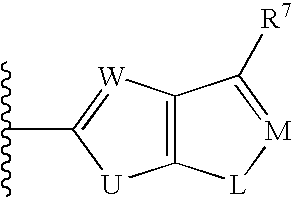Biaryl sulfonamides and methods for using same
a technology of biaryl sulfonamide and sulfonamide, which is applied in the field of biaryl sulfonamide, can solve the problems of undesirable effects and variety of pathologies, and achieve the effect of inhibiting metalloproteinases
- Summary
- Abstract
- Description
- Claims
- Application Information
AI Technical Summary
Benefits of technology
Problems solved by technology
Method used
Image
Examples
example 1
N-({4′-[(1-benzofuran-2-ylcarbonyl)amino]-1,1′-biphenyl-4-yl}sulfonyl)glycine
[0434]
[0435]Step 1: To a flame-dried flask was added 4-aminobiphenylsulfonyl fluoride (0.75 g, 3 mmol) and methylene chloride (20 mL). The solution was cooled with an ice bath. Benzofuran-2-carbonyl chloride (0.54 g, 3 mmol) was added after the addition of N,N—N,N-diisopropylethylamine (1.50 equiv.). The ice bath was removed and the reaction mixture was allowed to warm to room temperature. The reaction proceeded at room temperature for 5 h. The reaction mixture was diluted with aqueous ammonium chloride solution (15 mL) and the precipitate was filtered and washed with aqueous ammonium chloride solution twice and water twice. The resulting solid was dried over vacuum and 1.05 g of N-{4′-[(1-benzofuran-2-ylcarbonyl)amino]-1,1′-biphenyl-4-yl}sulfonyl fluoride was obtained (Yield 89%).
[0436]Step 2: To a 10 ml round-bottom flask was added N-{4′-[(1-benzofuran-2-ylcarbonyl)amino]-1,1′-biphenyl-4-yl}sulfonyl fluor...
example 2
L-2-{4′-[(Benzofuran-2-carbonyl)-amino]-biphenyl-4-sulfonylamino}-3-methyl-butyric acid
[0438]
[0439]Step 1: To a 10 mL round-bottom flask was added N-{4′-[(1-benzofuran-2-ylcarbonyl)amino]-1,1′-biphenyl-4-yl}sulfonyl fluoride (0.118 g, 0.3 mmol) and DMSO (2 mL), followed by the addition of L-Valine t-butyl ester hydrochloride (5.0 equiv.), N,N-diisopropylethylamine (10 equiv.), 4-(dimethylamino)pyridine (0.3 mmol) and sodium iodide (cat.). The mixture was heated to 120° C. for 6 h and was diluted with aqueous ammonium chloride solution (5 mL) and ethyl acetate (15 mL). The aqueous layer was extracted with ethyl acetate (10 mL×2). The combined organic layers were washed with brine twice, dried with anhydrous sodium sulfate. After concentration, the crude product (110 mg) was purified with flash chromatography to give N-({4′-[(1-benzofuran-2-ylcarbonyl)amino]-1,1′-biphenyl-4-yl}sulfonyl)glycine t-butyl ester (65 mg).
[0440]Step 2: N-({4′-[(1-benzofuran-2-ylcarbonyl)amino]-1,1′-biphenyl-...
example 3
N-({4′-[(1H-indol-2-ylcarbonyl)amino]-1,1′-biphenyl-4-yl}sulfonyl)glycine
[0441]
N-({4′-[(1H-indol-2-ylcarbonyl)amino]-1,1′-biphenyl-4-yl}sulfonyl)glycine was prepared according to the procedure of Example 1, using indole-2-carbonyl chloride and 4-aminobiphenylsulfonyl fluoride in Step 1, and L-valine-t-butyl ester hydrochloride in Step 2.LCMS MH+ (m / z) 492. 1H NMR (300 MHz, DMSO-d6): δ 11.62 ppm (s, 1H), 10.20 ppm (s, 1H), 7.95-7.22 ppm (m, 11H), 7.04 ppm (dd, 1H, J1=7.2 Hz, J2=7.5 Hz), 6.8 ppm (dd, 1H, J1=7.2 Hz, J2=7.5 Hz), 3.43 ppm (d, 2H J=5.8 Hz).
PUM
 Login to View More
Login to View More Abstract
Description
Claims
Application Information
 Login to View More
Login to View More - R&D Engineer
- R&D Manager
- IP Professional
- Industry Leading Data Capabilities
- Powerful AI technology
- Patent DNA Extraction
Browse by: Latest US Patents, China's latest patents, Technical Efficacy Thesaurus, Application Domain, Technology Topic, Popular Technical Reports.
© 2024 PatSnap. All rights reserved.Legal|Privacy policy|Modern Slavery Act Transparency Statement|Sitemap|About US| Contact US: help@patsnap.com










